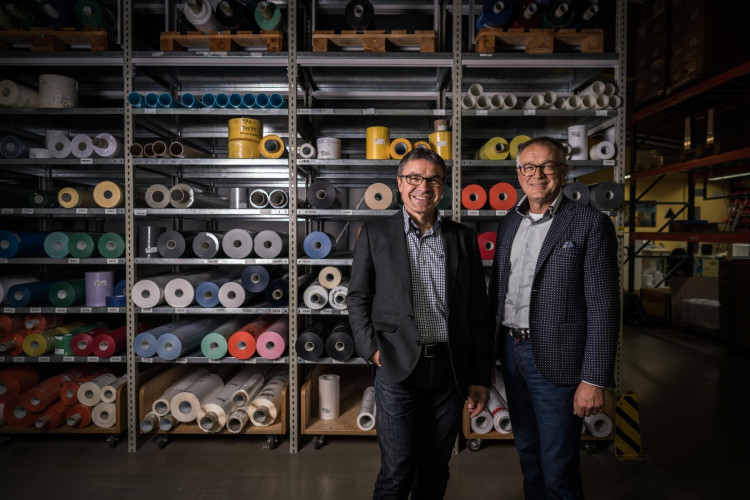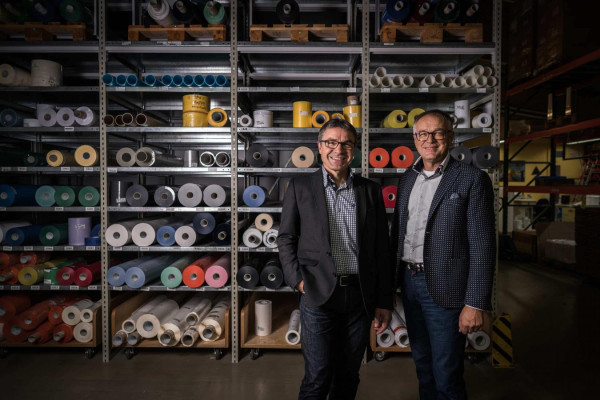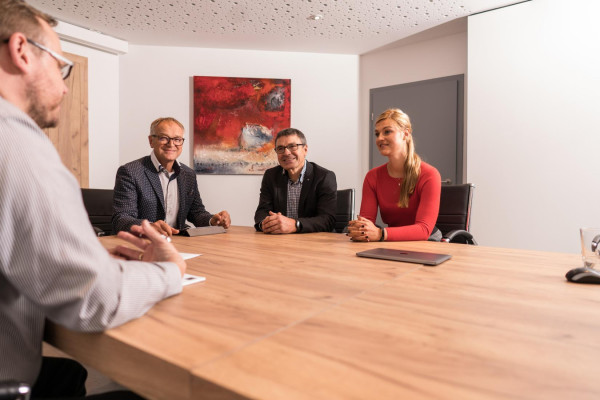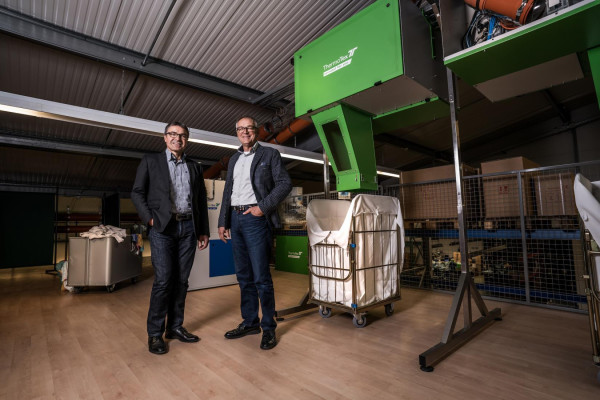- Home
- Company
- Applications
- Products
- Service
- Contact
- Outlet
- News about Corona
- Customer satisfaction survey


There’s a sense of the end of an era at Schutterwald. Not in the sense of endings as such but rather positively in the sense of new beginnings. A thirst for action. The pioneer spirit. Excitement for the future. A pleasure in new technologies. Two engines of this development are the managing partners, Helmut Czichon and Dietmar Nagel. Looking back at the successes of a good 30 years? With pleasure. But the two men of action get even more enjoyment out of talking about tomorrow and the day after, about new markets and machines that are even more efficient. In focus: The Next Generation.
Dear Mr Nagel, dear Mr Czichon, Many congratulations on 30 years of THERMOTEX! Tell us: What does it feel like to be celebrating such an anniversary?
Czichon: Very good indeed. After all, for us those 30 years are 30 years of success and 30 years working with good employees. We’ve continually developed with innovation, focused on new products and are now active in 60 countries - and that feels really great. It sounds like you are very proud of your team and business.
Nagel: We started out as a two-man operation. Today, we are a well-positioned, mid-sized company, have dynamic growth, are ahead of the competition in terms of technology and are continually developing. That not only makes us proud but also gives us a really super feeling. Also with regard to the excellent people we have on board. We work as a team and can get through anything together, through thick and thin. And we have a strong family in the background that has put up with a lot and still continues to provide us with that support. Without our wives, we definitely wouldn’t have seen the success that we have had.
If you want to think about how long 30 years actually is, you just have to look back at the curiosities of 1988: Holland was European Champion, the DAX was introduced in the German stock market and the world was moaning about the first real computer worm. Do you still remember the beginnings of THERMOTEX?
Nagel: Oh yes, very well. We wrote text on labels with laundry markers, introduced the first computer printer, cut out or coated the heat seal patches by hand, stood at the machines ourselves and expanded THERMOTEX at a rapid pace. A year and a half after founding the company, we took part in our first major trade fair in Hanover. They were really some wild times. But it was amazing!
How does anyone come up with the idea of setting up a company for textile logistics? When you go out clubbing in the evenings, you better make sure you’re a good dancer, if you want to make an impression …
Czichon: You’re right about that. The background was that my father-in-law, Dietmar Nagel’s father, had a lot of experience in this area thanks to his earlier career. He realised that there was plenty of room for improvement when it came to organisation and logistics in laundries. The laundry personnel worked in constant worry in those days: The laundry got mixed up or items went missing … and even when the laundry personnel had done everything correctly, they had no way of proving it.
So in other words: The real secret behind 30 years of success is obviously an obsession with organisation …
Czichon: I suppose you could say that, right?
Nagel: That we help to create and keep order? I think so. We’re like that in our private lives, too. Is it true that THERMOTEX was the first company in Germany to use QR codes?
Czichon: Back then they were still called data-matrix codes. They were only called QR codes later on. At the time, we had brought home some software from the USA that at the start was of no use to us at all. We used these QR codes for the first time in the early 1990s with the Rentex Group and quickly impressed the entire group. No other use was known in Germany back then. Something like that can also be a liability …
Nagel: Yes, but in the first place it is the incentive to drive these systems further along. With electronic labels in the form of RFID and transponders, we’re taking the next step, bringing further process optimisation with it. A QR code or a barcode has to be scanned by hand. A transponder, on the other hand, is position-dependent and can be read very quickly and in great numbers via an antenna. 
The motto of this anniversary year is: The Next Generation. Is that what it means?
Nagel: In the first place it means new products in the area of heat sealing and printing systems. We want to develop our systems further in the direction of Industry 4.0. We are convinced that it helps our customers when the machines are more and more closely networked …
… so new technologies?
Czichon: We’re changing from product manufacturer to system provider: But “the next generation” also means that we want to promote our employees and give them the chance to develop professionally and create their own ideas. And it also refers, of course, to the next generation of the family: That’s why my daughter Julia is already sitting at the table today.
Nagel: It was always important to us to have a good mix: young blood and old hands. And that everything fl ows smoothly. We are also facing more great change in the next years, as several of our employees move into well-deserved retirement. We’re constantly working on this issue to ensure that experience can be passed on.
THERMOTEX makes work clothes, flat textile products and residents’ laundry intelligent through the use of codes and chips. This means that a piece of clothing knows where it belongs and how it should be handled …
Czichon: We make sure that every piece of laundry in the laundry cycle always finds its way to its user and back. To this end, we label around 1.2 billion items of laundry every year. This probably doesn’t make the piece of laundry any more intelligent. A washcloth is still a washcloth and a sock is still a sock. But the technology with which this piece of laundry goes through the cycle is decisive, meaning that you can tell, for example, its service life. From this information, you can determine: Have I made a profit on this item oflaundry? Could I have washed it 50 times? Or maybe just 20 times?
Market participants always focus on efficiency …
Nagel: The industry is characterised by strong competition, falling prices and great cost pressure. To work against this for our part, we try to enable maximal cost savings for our customers using intelligent solutions. And higher process effi ciency is part and parcel of this. In order to make every day just a little more innovative, you first have to convince the whole team to take this path.
Czichon: We place great value on internal training and of course undertake this regularly with our employees. We actively look out for trends and implement these as promptly as possible. This way, we can offer our customers solutions. Not just for now or for today, but also for the future. When people achieve something, they tend to say: OK, I have achieved this one thing now and that’s enough for right now. How do you manage to keep your employers hungry for more?
Nagel: We ourselves are drivers. Not just the management of the business but also the second and third levels. Our customers are constantly stimulating us to develop new solutions. Whether that’s customer projects, research and development projects or in-house organisational projects.
Czichon: We motivate our employees to ensure that the company always gets new input from them too. This allows us to permanently have new trends in the pipeline.
Is this innovation tempo the reason why you insist on complete location within Germany when it comes to development and production?
Czichon: We’ve simply had good experience with Germany as a location and our home turf on the edge of the Black Forest. Here we can find highly-qualified technicians in the areas of sheet metal processing and electronics. And there is also excellent personnel:engineers, technicians, graphic artists, marketing people and inventors.
Which leads nicely to my next question: It’s said that the Black Forest natives have the inventive spirit in their blood. It is true?
Czichon: Inventors and thinkers - yes. We like to take on technical challenges that maybe aren’t even expected in the market. We simply believe that it will have a place in the market at some point and have never been disappointed so far.
Nagel: The location is incredibly important to us. Also because we’ve had nothing but excellent experience with the regional suppliers. It’s not even an issue for us to produce in low-wage countries because we appreciate the concentrated skills that we have here. Moreover, we aren’t involved in the consumer sector but rather supply top-quality products, because textile labelling is a matter of trust. Take for example a work clothes rental company that turns over millions of units per year. When the barcodes or labels don’t last, the whole operation grinds to a halt! With chips in textiles, it can’t be far off before laundry items and washing machines communicate with each other.
Nagel: There already are some inroads in the industry. But this isn’t necessarily down to THERMOTEX alone … so the socks tell the machine how they want to be washed?
Czichon: In theory, they can already do that today if the software is programmed appropriately. It’s really no problem to teach the socks: You are black and you need to be washed at 40°C. They then communicate this and the sorting can be undertaken accordingly, accurately and without mistakes. 
And when supplies dwindle, the ERP system automatically orders replacements?
Nagel: ERP systems re-ordering chips and labels from us is the future. Procuring laundry will happen the same way.
Czichon: When stock levels in a hospital fall below the minimum, an online signal is sent to the laundry. In the future, an intelligent system will know what is in the laundry, what is in stock and what is being used on the wards. This also reduces standing stock because the various units can be turned around much quicker.
If we look 30 years into the future: Will people still be working in laundries in 2048?
Czichon: We will see much more automation in operations. Handwork is becoming less and less. We won’t have any screens anymore but will work instead with holograms. And holograms might work one for one alongside humans. Accordingly, work steps can be predefined and processes arranged simply defect-free. We see all of these things in the future. Textile labelling codes or transponders will thus be needed in order to implement these technologies.
Will THERMOTEX still operate mainly in Europe then?
Nagel: We are already aligning ourselves increasingly internationally …
Czichon: … and already operate in 60 countries. THERMOTEX is known in Australia, Japan and many other markets. America on the other hand is a tough market for us. Import egulations, customs regulations, long distances. A huge distribution network would be required to provide such a vast continent with the services we want to provide. That’s a topic for the next generation.